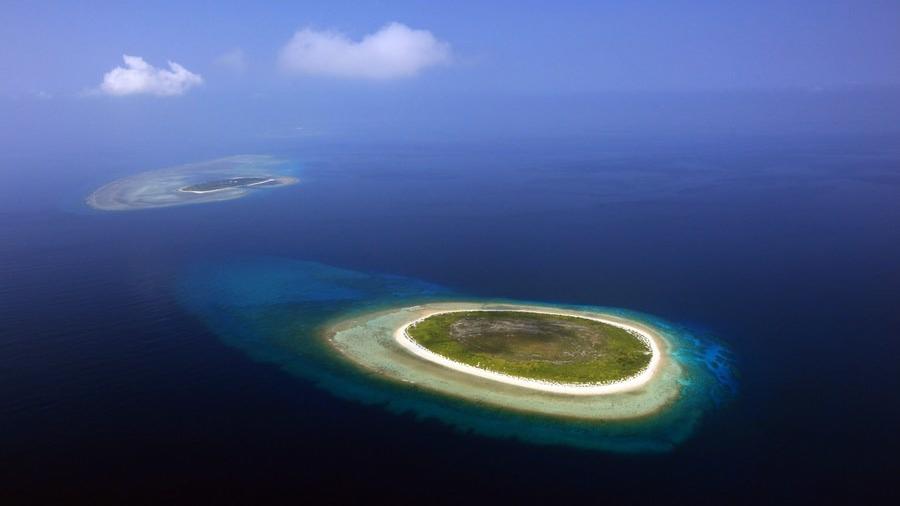 This file photo dated Jun 1, 2011 shows the scenery of China's Xisha Islands, South China Sea. (PHOTO / XINHUA)
This file photo dated Jun 1, 2011 shows the scenery of China's Xisha Islands, South China Sea. (PHOTO / XINHUA)
The Philippines needs to remain neutral and strive to peacefully resolve disputes over the South China Sea, a forum in Manila heard amid the ongoing expansion of the Southeast Nation’s defense pact with the United States.
In a forum held in Manila on April 3, experts from China and the Philippines discussed the 7th Meeting of the Bilateral Consultation Mechanism on the South China Sea, or BCM.
On March 24, China’s Vice-Foreign Minister Sun Weidong co-chaired the 7th Meeting of the BCM with Philippines’ Foreign Affairs Undersecretary Maria Theresa Lazaro. The meeting, which was held in Manila, was the first face-to-face BCM meeting between the two countries since the pandemic
Experts from the Philippines said it is important to maintain peace and stability in the South China Sea. They also urged for more transparency and people-to-people exchanges so that even ordinary citizens – not just government officials, the military and diplomats – will be more aware of the issue.
READ MORE: Australia, Philippines discuss joint patrols in South China Sea
“The peace and stability in the South China Sea is very important. It's not just the concern of the Chinese and the Filipinos, but the concern of the world,” said Anna Rosario Malindog-Uy, ACPh’s vice-president for external affairs. Malindog-Uy alluded to several claimants of the South China Sea, such as China and the Philippines, and how territorial disputes have strained relations.
Malindog-Uy, who delivered her closing remarks via video, said it is important for China and the Philippines to have a mutual understanding on the South China Sea. She said apart from government to government negotiations, people to people exchanges need to be promoted.
“Chinese and Filipinos need to talk about this through (forums among) think-tanks and organizations so that we can clarify issues and educate ourselves on the issue,” Malindog-Uy said.
Melissa Loja, senior research fellow at the IDSI and an expert on international law, proposed academics in all the claimant states can gather together to “examine the history behind the South China Sea , even just as an academic exercise”. She said this will help more people to be “better informed and therefore better able to decide for themselves regarding this issue”.
Loja said there are efforts to minimize tensions between China and the Philippines over the South China Sea. “As a Filipino and as a civilian I am very much interested in the (dispute resolution) process,” she said. Loja said that she is hoping that a monitoring system can be created so that even ordinary citizens can access information on the agreements and cooperation on the disputed waters.
On March 24, China’s Vice-Foreign Minister Sun Weidong co-chaired the 7th Meeting of the BCM with Philippines’ Foreign Affairs Undersecretary Maria Theresa Lazaro. The meeting, which was held in Manila, was the first face-to-face BCM meeting between the two countries since the pandemic.
According to a press statement issued by China’s Ministry of Foreign Affairs, the two sides had a candid and in-depth exchange of views on the situation in the South China Sea and maritime issues of respective concern.
Both countries also agreed to exercise restraint, make good use of the hotline between the two foreign ministries, improve maritime communication and dialogue mechanisms, and enhance talks and exchanges between different departments and on multiple levels.
Loja of the IDSI also warned against the Philippine government’s decision to expand US access to military facilities in the Philippines. She was alluding to the enhanced military alliance between the Philippines and the US under the Enhanced Defense Cooperation Agreement, or EDCA.
Loja said the Philippines “should maintain its neutrality,” in light of potential competition between the US and China. She said that this is the same policy that other Southeast Asian countries like Indonesia and Singapore have adopted.
By expanding the EDCA, “there is a chance that US weapons will be housed in (our) territories and that would (undermine) the status of neutrality of the Philippines in case of a nuclear conflict,” Loja said.
READ MORE: China, ASEAN countries 'agree on marine cooperation projects'
The hybrid forum, which was held in Manila, was organized by Asian Century Philippines Strategic Studies Institute in partnership with the South China Sea Strategic Situation Probing Initiative, Integrated Development Studies Institute, the Philippines China Mutual Cooperation Society, Global Talk News Radio and the Philippine BRICS Strategic Studies.
Forum moderator Austin Ong, research analyst at Integrated Development Studies Institute, a Manila-based think tank, noted “a breath of fresh air to see a different perspective” from the field of geopolitics and international law.
“There are efforts for all parties, including claimant countries (and) third party countries who are playing key roles or influence in the region are also important,” he said. He also cited the dispute between China and Vietnam, but noted that “at the end of the day, they are…expanding their cooperation.”
prime@chinadailyapac.com


